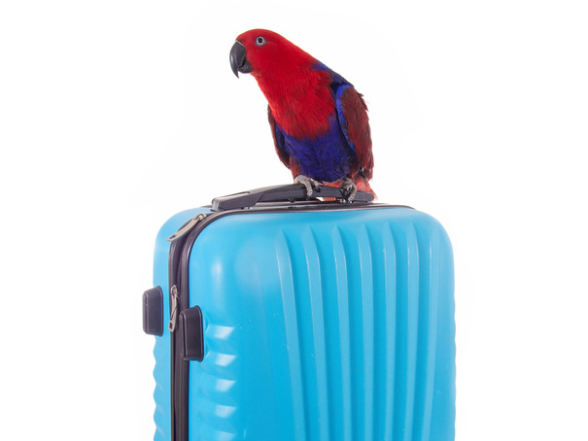Travel with pet birds is subject to strict regulations designed to prevent avian flu from being brought into Switzerland. Since many birds are protected animals, additional species conservation regulations must also be observed.

The travel regulations apply to birds kept as pets (see What are pets?) that are travelling with their owner and are not intended either for sale or for transfer to new owners.
Leaving Switzerland and entering the holiday country
When leaving Switzerland with pet birds, the entry regulations of the destination country must be observed. Information can be obtained directly from the representations of the destination country.
If the birds belong to a protected species (e.g. parrots, parakeets), both the animal health regulations and the entry regulations for protected species in the destination country must be observed (see Contacts). Detailed information can be found on the summary page Travelling with pets.
Entering Switzerland
General provisions
- The following entry regulations apply to birds kept as pets , except fowl, turkeys, guinea fowl, ducks, geese, quails, pigeons, pheasants, partridges and ratites, which are in any case subject to the regulations for commercial import.
- If the birds belong to a protected species (e.g. parrots, parakeets), both the animal health regulations and the entry regulations for protected species must be observed. Detailed information can be found on the summary page Travelling with pets.
- The entry of birds of non-protected species from the following countries is governed by the same regulations as those covering entry from the EU: Andorra, Faroe Islands, Greenland, Iceland, Monaco, Norway, San Marino, Vatican City (this does not apply to animals captured in the wild).
Entering from the EU
No special documents are required to bring birds from the EU into Switzerland provided that the above general requirements are met.
Entering from a third country
The following entry regulations must be observed:
- A veterinary border control is mandatory for all birds entering from a third country. For this reason, direct entry into Switzerland is possible only via the airports of Zurich and Geneva. Veterinary border controls can only be carried out during regular opening hours (see Contacts). Birds arriving outside these times will be taken to the control post’s animal facility and not controlled until the next working day.
- Birds must be accompanied by a veterinary certificate and a declaration of ownership (see "More information").
- Since no quarantine facilities are available in Switzerland and vaccination against avian influenza is not permitted, the quarantine requirements must be fulfilled before entering Switzerland (as set out in the veterinary certificate, part I.25 and part II). Birds may therefore only be brought into the country if, before leaving the country of origin, they have been kept separately and officially monitored for at least 30 days or have spent at least 15 days in quarantine and have been examined for avian influenza by an official vet.
- Birds must be taken to a household or another residence and are not permitted to take part in shows, fairs, exhibitions or other events involving birds until 30 days after their arrival at the earliest.
Veterinary border control
Entry is possible unaccompanied by airfreight or accompanied as excess baggage in the aircraft’s cargo hold. The owner must be able to prove on entry that the birds were already in his possession in the country of origin.
Accompanied pet birds
Birds may be registered as excess baggage (“AVI in hold” or “excess baggage”) only if the owner is travelling on the same aircraft. On arrival, the birds must be collected at the baggage carousel, the red customs channel taken and the birds reported to customs. Customs informs the veterinary border service. A transport company then takes the birds to the animal facility. All documents required for importation must accompany the birds at all times. The veterinary border inspection takes place at the animal facility. After leaving the terminal, the owner goes to the office of the border veterinary service in the cargo area (map available at customs in the terminal). Once the border veterinary service has carried out the inspection and the customs formalities have been completed, the birds can be collected.
Unaccompanied pet birds
If pet birds are travelling without their owner, i.e. unaccompanied, they can only enter as freight. On registration, the airline assigns an airway bill number (AWB) to each bird. On arrival, the bird is taken directly to the animal facility, where the veterinary border inspection takes place. Entry as an unaccompanied pet is possible, in principle, within a period of five days before or after the owner’s arrival. If this period cannot be complied with, it is necessary to check that the bird was already under the owner’s charge in the country of origin. Relevant information and supporting documents must be submitted to the FSVO for verification.
Depending on the type of entry, costs may apply for transport at the airport, a stay at the animal facility, veterinary border inspection, customs duties and any additional fees. Please contact the relevant authorities for further information.
More information
Last modification 14.06.2024




